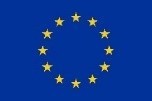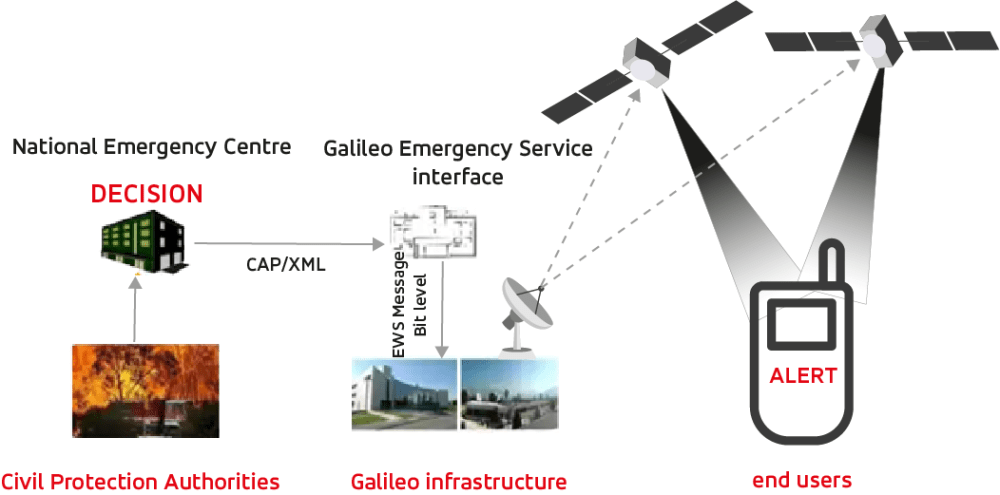EUSPA awards GMV the contract to develop Galileo's Emergency aid Satellite Services
The European Union Agency for the Space Programme (EUSPA) has awarded GMV a FWC contract to deliver new Galileo functionalities under EmeRgency Alerting System (ERAS), allowing EUSPA to provide new Emergency‑related services, namely the Emergency Warning Satellite System(EWSS), SAR/Remote Beacon Activation and SAR/Two-Way Communications Emergency. The four-year contract, worth around 6 million euros, will enable significant progress in Europe's response capabilities to natural and man-made disasters. The GMV‑led industrial organization includes Ineco, ALTEN Spain, and Kineton as subcontractors.
The new ERAS system will in the first place, allow Member States National Civil Protection Authorities for on‑demand broadcast of Emergency Warning messages to be sent directly to the population in areas at risk or already affected by a natural or provoked disaster, which will be transmitted directly by the Galileo satellites to smartphones or any other device capable of receiving signals from these satellites. The alert messages will include information related to the type of risk, its severity, the area affected, as well as the expected time of onset its duration and guidance to react. The system will allow national civil protection authorities to generate and validate the content of the Alert through dedicated web-interface.
Innovation and service advantages in critical situations
EWSS and ERAS will be yet another Galileo a major differentiator offering resilience, complementary to other existing public warning Systems, independence of terrestrial and mobile networks, able to reach the population fast and with a global reach. ERAS will be particularly beneficial and useful for inhabitants of remote regions of Europe with little or no mobile coverage.
As a complement to existing warning systems, ERAS will increase the resilience and safety of European citizens in the face of all types of disasters. The joint use of ERAS and the Emergency Management Service provided by Copernicus will strengthen the disaster management policies of the European Union and its Member States.
The system is expected to be fully operational in the first half of 2026, which is a challenge in terms of deadlines and technical complexity. GMV's vast experience in carrying out similar projects is a guarantee of success.
Europe faced with climate change and the need for adaptation
The ESOTC report (State of the Climate in Europe - State of the Climate in Europe in 2024), prepared by the Copernicus Climate Change Service, highlights the growing effects of climate change in Europe. This tool is essential for governments, scientists, and the general public, providing data that provides a better understanding of the impact of climate change in Europe and informed decisions on measures to be taken.
In the last five, years Europe has witnessed extreme events such as heat waves, forest fires, floods, and droughts. The ESOTC report underlines Europe's increasing vulnerability to these phenomena, highlighting the urgent need for effective warning systems, robust climate policies, adapting Europe's infrastructure to new climate challenges and improved planning to reduce the impact on the population and the environment.
Last year we witnessed the largest forest fire on record in Europe (Greece, 2023), while Mediterranean Sea temperatures reached record levels. In addition, Europe remains the fastest warming continent, with temperatures rising about twice as fast as the global average. Heat waves have not only affected the environment but have also had serious repercussions on human health. In Spain specifically, there have been major natural disasters during the last five years. Devastating wildfires, especially in 2022 and 2023, the Sierra Bermeja fire (2021) and the recent ones in Tenerife (2023) are among the worst, with thousands of hectares burned and the evacuation of hundreds of people. Heat waves have also been recurring. The most recent ones, in areas of Castilla-La Mancha and the Valencian Community, have caused massive evacuations and very significant economic damage.
The joint use of Galileo ERAS and the Copernicus Emergency Management Service will enable the population to be alerted to the risk of disasters such as the recent one in Valencian (Spain).

This contract is carried out within the framework of a programme funded by the European Union. The views expressed in this press release are the sole responsibility of the author and do not necessarily reflect those of the European Commission or European Union Agency for the Space Programme (EUSPA).
More info:
Corporate Marketing and Communications
[email protected]
